
https://www.youtube.com/watch?v=nk4DAjtcviI
The 7 Warning Signs of a Vitamin D Deficiency - Dr. Berg
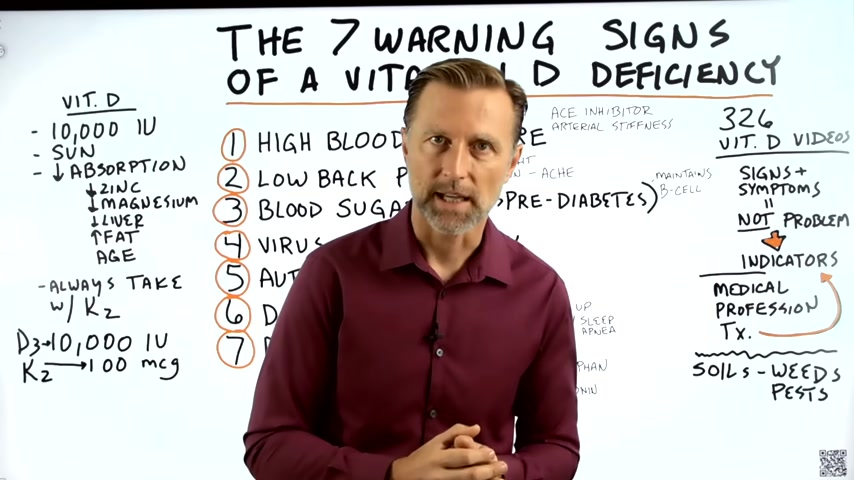
There are actually 7 warning signs of a vitamin d deficiency .
Now recently , I looked how many videos I have on vitamin d on YouTube , and I found out it was 326 videos .
So I'm sure that you've seen pretty much all of them .
But if you haven't , this video is kind of a summary of the key warning signs .
But what you need to realize is that a warning sign or a symptom is not the problem .
It is an indicator of a problem , but it's not the problem , and I'm gonna let you in on a little secret .
The medical profession treats indicators .
Okay ?
They treat the indicators , and the treatment lasts for about 24 hours .
Because if you only treat the indicators , you have to keep treating them over and over and over again .
And the same thing happens with your garden or in farming .
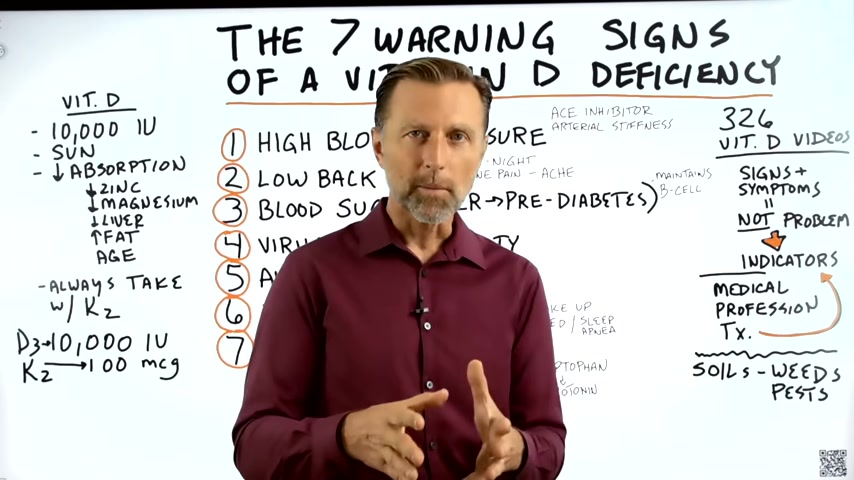
If you have excessive weeds or pests or insects , you know , you might think those are the problem , but they're really not .
They're an indicator that there's something going on with your soil , some condition that is not good , or with the plant that is unhealthy .
You know , there is actually a great test , and I'm gonna do a video on this .
It's called the BRICS test , and it's a very simple and expensive test that anyone can do on their garden plants or fruit to determine on a certain scale how healthy or fertile that plant or fruit is .
And if that plant or fruit is above 12 , it's immune from insects .
Insects do not touch it .
They don't eat it .
They don't start to destroy it .
Insects go after plants that are dying and decaying , but they don't go after healthy fruits or plants , which is very fascinating .
In our body , it's the same thing .
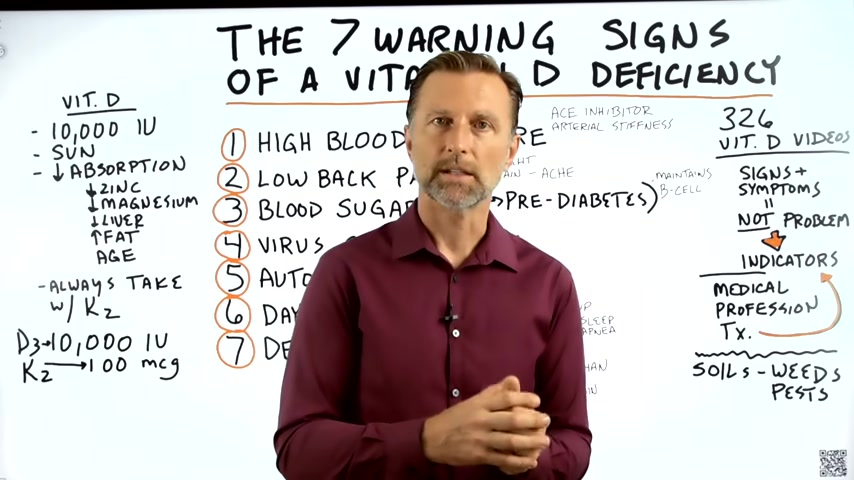
You're as strong as your weak link .
If your system is weakened , you're very susceptible to pathogens , viruses , bacteria , etcetera .
So it's really important to understand and differentiate between an indicator and the real problem .
Today , we're gonna talk about the 7 indicators of a vitamin d deficiency , which is at the root cause of many different problems .
So let's start with number 1 , high blood pressure .
Okay .
That is one indicator that your vitamin d is low .
In fact , it's a real common one .
There's 2 things that I find that can help resolve hypertension .
1 is vitamin d , and number 2 is potassium .
But vitamin d is intimately involved because it can act as an ACE inhibitor .
They use ACE inhibitors for think it's 48% of all first line treatments for high blood pressure .
Okay ?

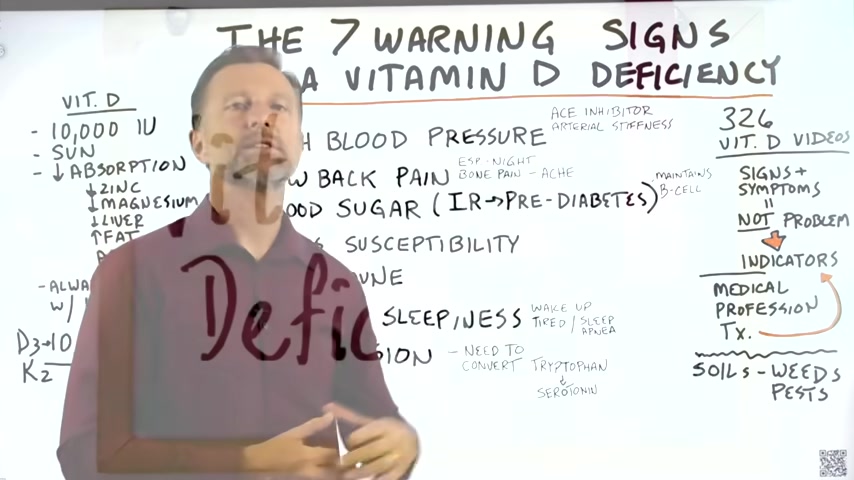
And vitamin d acts like an ACE inhibitor .
If you're deficient in vitamin d , you'll get arterial stiffness .
In fact , there's a huge correlation between people having low vitamin d and having hypertension .
In fact , I'd be really curious if anyone who had high blood pressure didn't have a vitamin d deficiency .
Okay .
Number 2 , low back pain .
This is a really good indicator that you're low in vitamin d , especially if you get , like , achiness in your lower back , in the muscles .
And if you have low back achiness at night when you're trying to sleep , classic vitamin d deficiency .
In fact , vitamin d is one of the most powerful anti inflammatories , natural anti inflammatories because it acts like a steroid .
It acts like prednisone , but without the side effects .
So you could virtually have inflammation anywhere in your body , not just the lower back .
Alright .
Number 3 , blood sugars .
Now this is interesting .
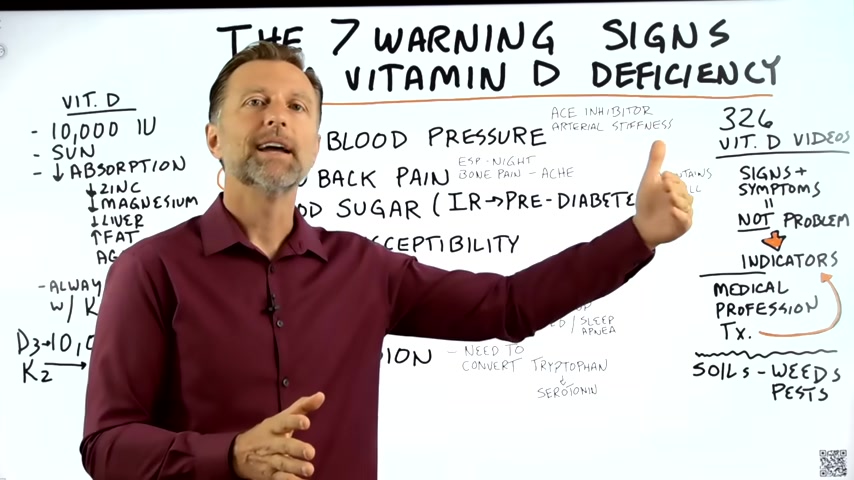
When you're low in vitamin D , you're way more susceptible to getting insulin resistance , and you're way more likely for that insulin resistance to turn into a prediabetes , and you're more likely for the prediabetes to turn into diabetes .
Why ?
Because vitamin d has a very important purpose of maintaining your beta cells in your pancreas , the cells that control insulin .
Alright .
Number 4 , virus susceptibility .
There's not one aspect of your immune system that does not have receptors for vitamin d .
Vitamin d is the most important vitamin for your immune system .
So if you're low in vitamin d , you're way more susceptible to not just getting a viral infection , but a bacterial infection as well .
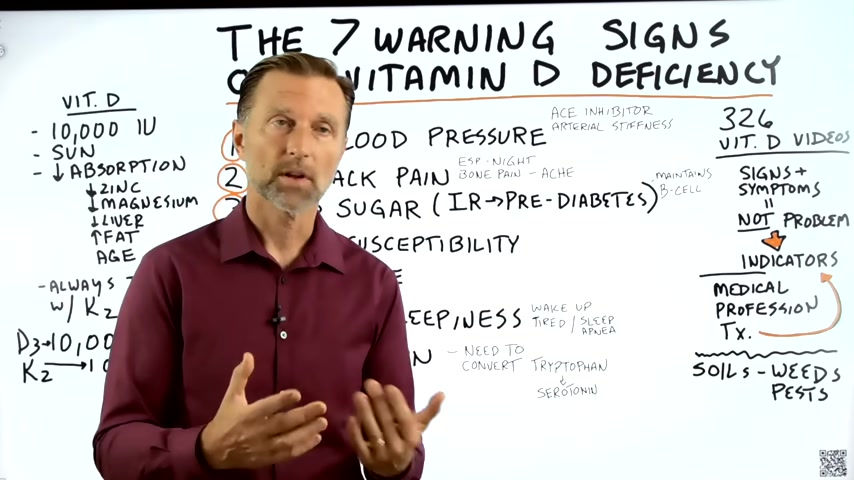
And so vitamin d protects you against pathogens , and it also can help to regulate , excessive amounts of inflammation as in the cytokine storm in your lungs .
Alright .
5 , autoimmune conditions .
I don't think there's any autoimmune disease out there that does not have a severe low vitamin d situation .
When you're low in vitamin d , you're highly susceptible to having immune problems as well as developing an autoimmune condition .
And vitamin d is one of the best natural treatments for autoimmune .
Why ?
Because it's a powerful anti inflammatory .
And think about what autoimmune conditions are .
Autoimmune conditions are a situation where your body is attacking itself .
It's an immune system that has gone rogue and you always have inflammation .

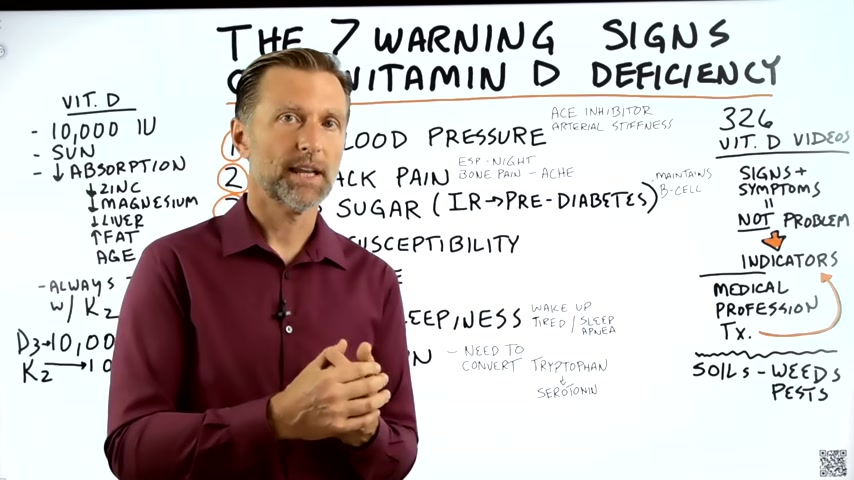
In fact , it's the inflammation that is causing most of the symptoms with autoimmune conditions .
So if you were to take , higher amounts of vitamin d , you know , like , maybe 30 , 40 , 50 IUs of vitamin d every day , you would probably notice remarkable improvement in your autoimmune condition .
Alright .
Number 6 , daytime sleepiness .
You can call this fatigue .
You can call this just being tired .
Huge connection with low vitamin d .
Now I don't know if that's because vitamin d is intimately involved with your sleep , especially behind sleep apnea , and you just feel tired .
Vitamin d helps the cells that control the circadian waves .
And without enough vitamin d , it can really throw off not just your circadian waves , but just make you feel lethargic , kinda tired all day .
And especially if you , like , have a really hard time getting up in the morning , we know you need vitamin d .

And it's interesting about vitamin d because sunlight actually helps increase vitamin d .
So I wonder if there's a connection with that .
Alright .
Number 7 , depression is a really good indicator that you need vitamin d .
Now why ?
Because vitamin d is needed to convert tryptophan , which is an amino acid into serotonin .
Okay ?
Serotonin is a hormone that really helps , your mood .
And if you're deficient , you can be very depressed , and you need as a requirement tryptophan , for the creation of serotonin .
And so vitamin d is needed for this conversion .
And this is another point I'll bring up for depression .
I don't think there is a a case of depression that does not have an underlying vitamin d deficiency .
Now can you imagine if someone had any one of these or all of these ?
Okay .
The indicators are being treated with a medication .
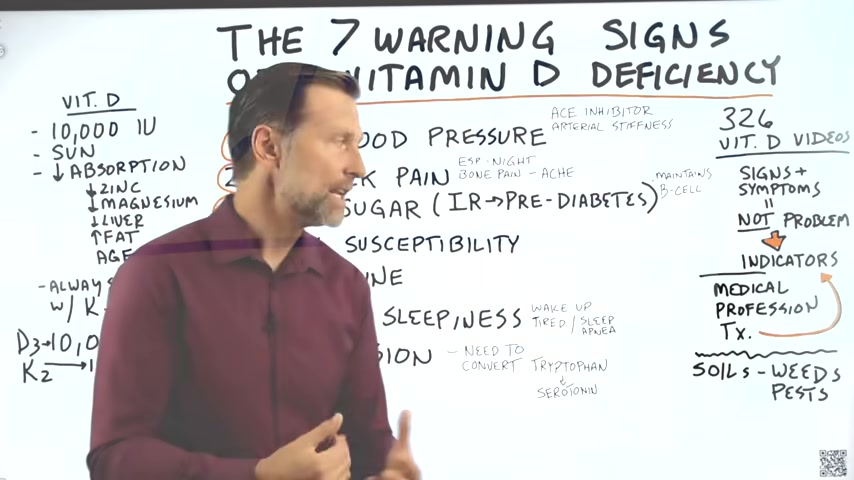
How much confusion that's gonna be ?
Because one medication is gonna create other side effects , and you don't know what's causing what .
But , unfortunately , the system is set up to manage your indicators and not treat underlying causes .
I wanna bring up another point .
Now you could be having , you know , being on the sun , getting enough vitamin d .
You could be eating foods with some vitamin d .
You could be taking the vitamin d supplement and still have problems for various reasons , which I'm gonna cover right now .
Number 1 , you can have , which is becoming more common , a genetic defect .
It's called polymorphism .
If you had some genetic testing , and you had a vitamin d receptor , mutation , that could be the reason why taking normal amounts of vitamin d is not not going to work .

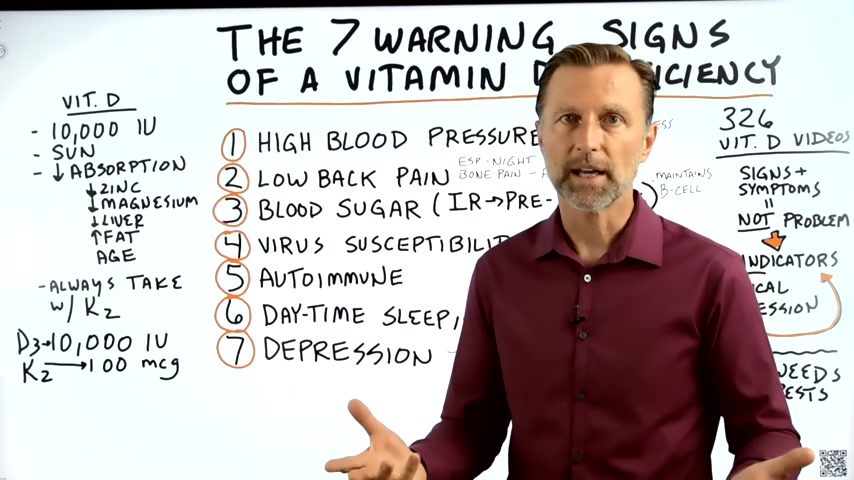
The other thing is that the RDAs for vitamin d are , I think , if I'm not mistaken , like , 600 IUs , which is a joke because that research has been done primarily on bone formation , but not all the other things that it can do .
So if you're taking 600 IUs thinking you're getting enough on top of absorption problems , if you have gut inflammatory conditions or past damage from an antibiotic , you're not gonna absorb vitamin d too well .
If you don't have enough liver function because your liver is fatty , you're not gonna be able to produce the bile to be able to absorb vitamin d , not to mention the activation of vitamin d .
Because in our bodies , we have inactive vitamin d and we have active vitamin d .
You need the liver and kidney to deactivate that .
Also , if you're low on zinc or magnesium , you're not gonna absorb vitamin d too well .
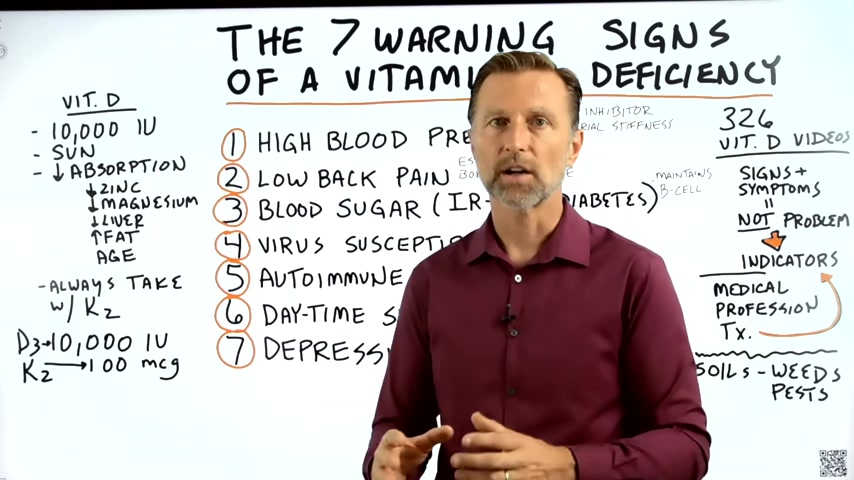
Also , if you're getting older , you need more vitamin d to create the effect .
Or if your skin is darker , you're gonna have more melanin that's going to block vitamin d .
So if you're on the sun , it takes a lot more sun to create more vitamin d .
Or if you are overweight , okay , or at instant resistance , which is also , the cause of being overweight that can block your ability to absorb Vitamin D .
So you can see there are so many other reasons why people might be deficient .
Now make sure if you're taking vitamin d , you take as a maintenance dosage 10,000 IUs .
Okay ?
If you think that's a lot of vitamin d , you should watch my video down below .
Always take vitamin k 2 with vitamin d .
Vitamin d helps absorb calcium by 20 times more .
So here we have all this calcium in the blood .
Right ?
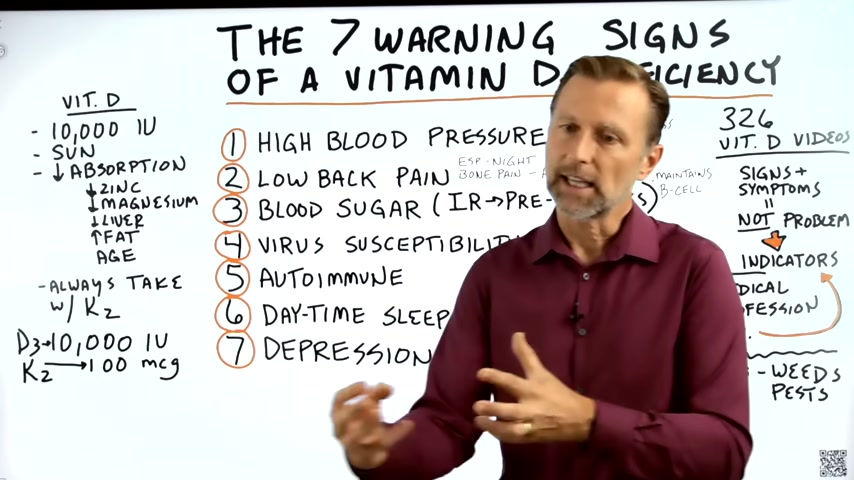
So that's actually performed with vitamin d , but we also need vitamin k 2 to help take that calcium in the blood and deliver the other half into the bones .
If we don't have enough k 2 , sometimes that calcium can deposit in the arteries as well as in your joints and other tissues .
So the ratios of of vitamin d 3 to k 2 would be like 10,000 IUs of d 3 to 100 micrograms of k 2 .
There's different versions .
The one that I recommend is the natural form , which is m 7 .
Alright .
Now that you have the basics on vitamin d , some people are concerned about toxicity .
I think you should watch that video next .
I put it up right here .
Check it out .

Are you looking for a way to reach a wider audience and get more views on your videos?
Our innovative video to text transcribing service can help you do just that.
We provide accurate transcriptions of your videos along with visual content that will help you attract new viewers and keep them engaged. Plus, our data analytics and ad campaign tools can help you monetize your content and maximize your revenue.
Let's partner up and take your video content to the next level!
Contact us today to learn more.